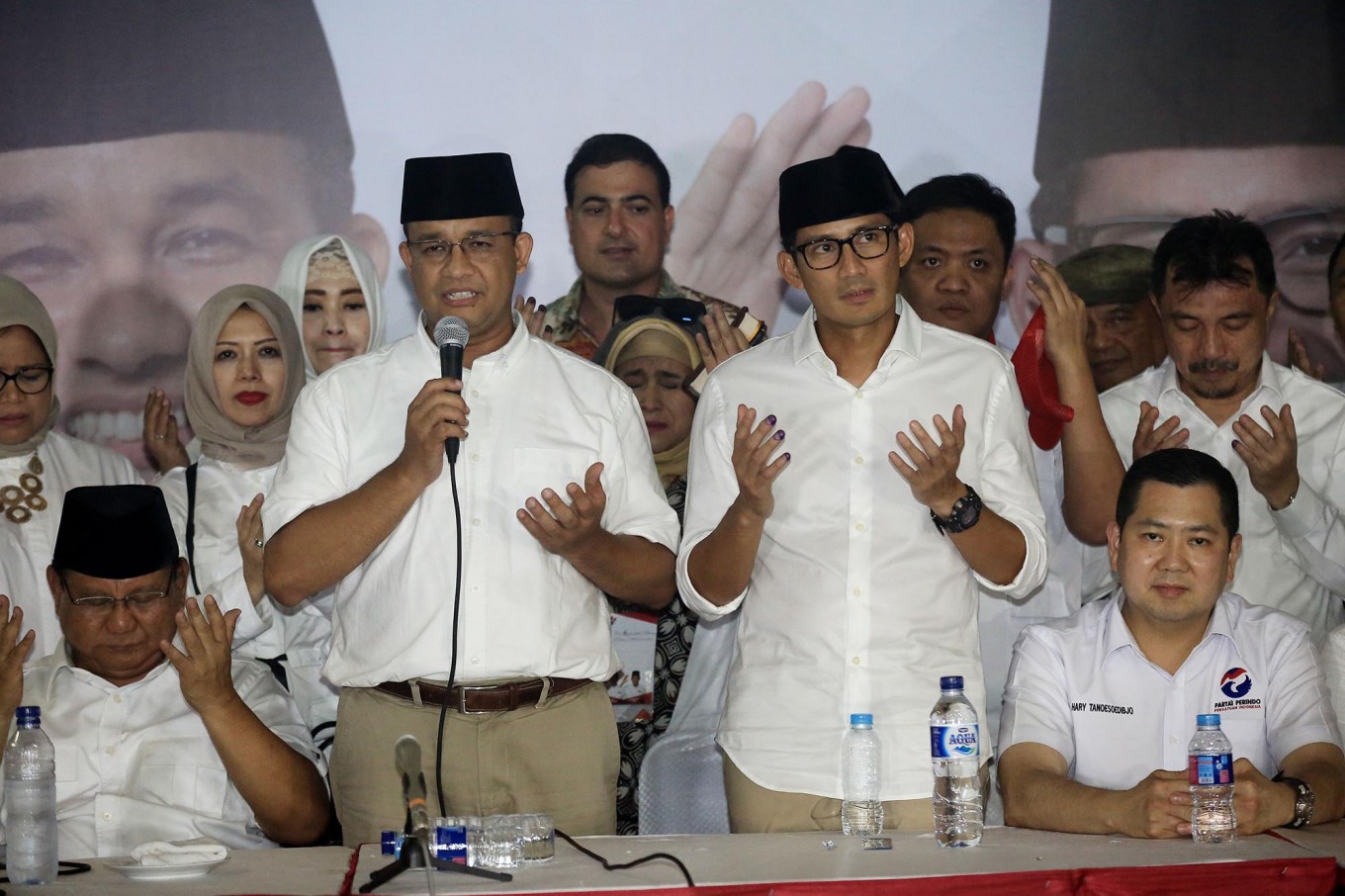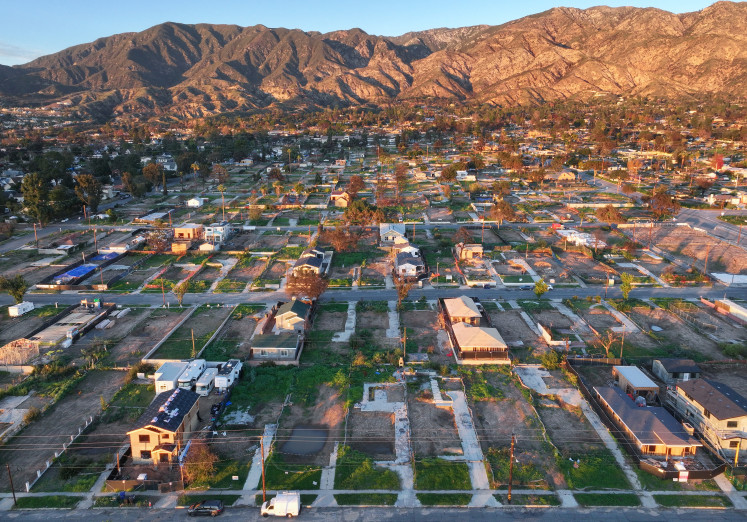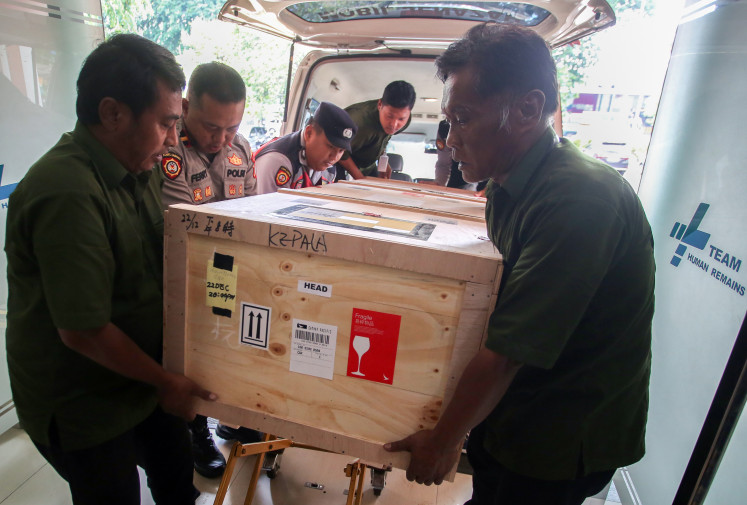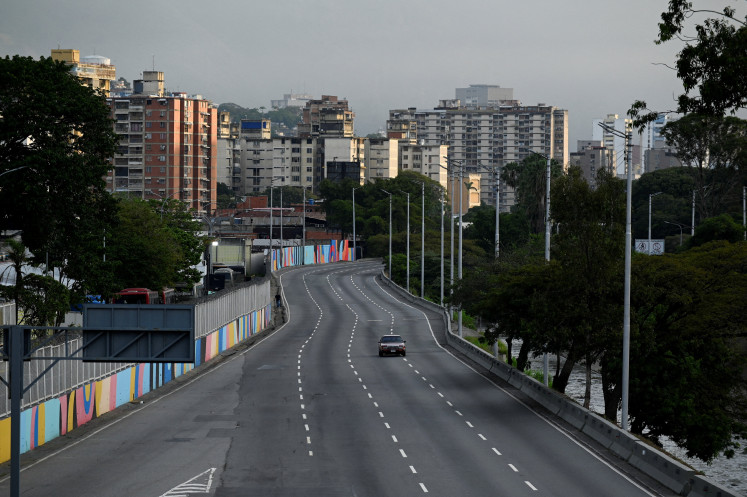Popular Reads
Top Results
Can't find what you're looking for?
View all search resultsPopular Reads
Top Results
Can't find what you're looking for?
View all search resultsBACKGROUNDER: After the Jakarta Election
Electorally, the result of the Jakarta election will especially influence coalition patterns in three upcoming major regional elections in Java.
Change text size
Gift Premium Articles
to Anyone
T
he Jakarta Elections Commission’s (KPU Jakarta) official vote count shows that Anies Baswedan and Sandiaga Uno won the 2017 gubernatorial election with a 15 percent margin. The pair secured 57.96 percent of the vote against 42.04 percent garnered by the incumbent ticket of Basuki “Ahok” Tjahaja Purnama and Djarot Syaiful Hidayat.
The official vote count also shows that Anies-Sandi prevailed in all municipalities and the one regency in the capital. Many voters in West Jakarta and North Jakarta who had picked Ahok-Djarot in the first round seem to have switched their support in the runoff. On the other hand, Ahok was still facing difficulties in penetrating Anies’ first-round strongholds, especially South Jakarta. This was evident in the significant surge of votes for Anies in South Jakarta in the runoff.
Electorally, the result of the Jakarta election will especially influence coalition patterns in three upcoming major regional elections in Java. In next year’s West Java election, coalition patterns are expected to follow what we saw in Jakarta. There is a good chance that the Gerindra Party and the Prosperous Justice Party (PKS) will collaborate again, as the Jakarta election proved their good chemistry. On the other hand, the Indonesian Democratic Party of Struggle (PDI-P), the Nasdem Party and Hanura will establish a coalition, especially if Gerindra and the PKS send strong signals they will indeed carry on their partnership. Once again, the Democratic Party will act as an alternative political choice and may very well emerge as a dark horse.
Changing voters
The victory of Anies and Sandi was influenced by the behavior of the middle class, which Ahok-Djarot’s campaign team and political consultants could not well predict. Amid the see-saw race between the two tickets, it was the middle class that determined Anies’ solid win. Overconfidence on the part of Ahok-Djarot supporters and their poor grassroots campaign also played a crucial role in Ahok’s defeat. The political machine in the parties that supported the incumbent pair are believed to have lacked solidity in campaigning for Ahok. Furthermore, Ahok took too long to establish communications with moderate religious organizations, including Muhammadiyah and Nahdlatul Ulama.
Silent voters
A recent survey by Jakarta-based think tank the Centre for Strategic and International Studies (CSIS) shows that around 17 percent of voters refused to state their choice in the runoff. This 17 percent could be either distributed evenly among both candidates or mainly belong to one of the tickets. CSIS then conducted several investigations to project the votes of these silent voters in order to find out where this 17 percent went.
The analysis showed that the silent voters, those who kept their choice a secret, tended to vote for Anies and Sandi. These silent voters were commonly middle-class people who usually concealed their preference, unlike lower-income people. These middle-class voters had at least mid-level educations and incomes.
The survey shows that voters with at least an undergraduate degree were more likely to conceal their choices than voters with lower levels of education. This is similar to income, in which there was a tendency that the richer a person was, the more likely that they would keep their choices to themselves.
There were fewer voters in Ahok-Djarot strongholds who kept their choices secret compared to those in Anies-Sandi strongholds, such as in East Jakarta and Central Jakarta. These two municipalities in fact had the highest percentage of survey respondents keeping their choices secret. Meanwhile, in South Jakarta, almost half of the survey respondents said that they were sure to vote for Anies.
When it comes to political choices, respondents who said they voted for Prabowo Subianto and Hatta Rajasa in the 2014 presidential election and were dissatisfied with the government’s performance thus far preferred to keep their choices a secret, more than respondents who said they voted for President Joko Widodo and Jusuf Kalla and were satisfied with the government’s performance.
High political tensions during the election prompted the middle class to remain silent about their choices. Influencing factors included a middle class reluctance to be associated with certain candidates and an effort to avoid being labeled as intolerant, ignorant or other negative associations.
One of the failures of the incumbent ticket’s campaign team members was their inability to understand the psychology of middle class silent voters. Excessive trust levels among Ahok’s supporters, which hindered the ability to read their opponent’s movements, also resulted in defeat.
Parties’ loyalty
On a side note, in the runoff election, political parties that supported Agus Yudhoyono in the first round seemed to have split. The United Development Party (PPP), both the Romahurmuziy and Djan Faridz camps, decided to support Ahok. The National Awakening Party (PKB) and the Democrats chose to remain neutral. The National Mandate Party (PAN), on the other hand, supported Anies-Sandi. The CSIS survey found that Anies-Sandi voters were more loyal than Ahok-Djarot voters. This was also apparent in Kompas daily’s exit poll.
In the run-off, the PPP’s support for Ahok and Djarot did not help much. Kompas’ exit poll showed that Anies’ voters (including PKS and Gerindra voters) were more solid than Ahok voters. The exit poll found that 99 percent of PKS voters and 93 percent of Gerindra voters chose Anies. Among the parties that supported Ahok, only the PDI-P had solid support, with 93 percent of its supporters voting for Ahok. Meanwhile, despite the PPP and Hanura officially supporting Ahok-Djarot, many of their supporters ended up voting for Anies-Sandi.
Party loyalty in Indonesia is generally poor. A political party’s official backing does not necessarily translate into its supporters’ political choices. A constellation of party loyalty at the elite level does not reflect loyalty at the grassroots level. Furthermore, mobilizations by parties supporting Ahok-Djarot were often too little, too late (including last-minute support from the PKB and PPP).
Future projections
Challenges for the new Jakarta governor will be to negotiate compromises with the city council, considering that Gerindra and the PKS, which backed Anies in the election, only control 24.53 percent of council seats. The parties that backed Ahok (Nasdem, the PDI-P, Golkar and Hanura) have 49.06 percent of the seats while Agus’ supporters, namely the Democratic Party, the PKB, PAN and the PPP, have 26.42 percent of the seats.
As such, Anies’ efforts to realize his campaign promises will not be a walk in the park. He may even have to soften up on a few of his campaign pledges. Good relations with the city council must be maintained to ensure that the council approves the city draft budget (RAPBD) he proposes.
Another challenge for the Jakarta governor-elect will concern continuation of a transparent budgeting process through the e-budgeting mechanism. Anies and Sandi’s daunting challenge is to prove their seriousness in eliminating the opportunities for corruption within the budgeting process.
***
Backgrounder is an independent research-based analysis by Tenggara Strategics, a business and investment research and advisory institution established by the Centre for Strategic and International Studies (CSIS), The Jakarta Post and Prasetiya Mulya University. Tenggara Strategics provides the business community with reliable business intelligence to enable them to tap into the valuable opportunities available when doing business in Indonesia.
---------------
We are looking for information, opinions, and in-depth analysis from experts or scholars in a variety of fields. We choose articles based on facts or opinions about general news, as well as quality analysis and commentary about Indonesia or international events. Send your piece to academia@jakpost.com. For more information click here.










